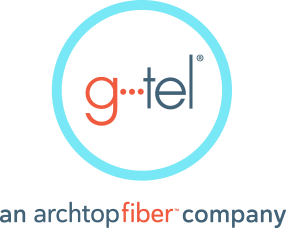Copyright Infringement Policy
Copyright infringement most commonly involves the possession, downloading, or sharing of electronic copies of music, movies, or videos without the permission or approval of the copyright holder. To protect their interests, copyright holders frequently monitor websites and other popular download locations to record the title, date, time, and Internet Protocol (IP) address associated with infringing activity.
It is the policy of GTel to discourage the use of our network and services, to download materials in violation of copyright, trademark or other intellectual property laws.
Based on the IP address involved, a copyright holder that believes an infringement has occurred will send the company a notice describing the event. When we receive such notices, we determine what customer was assigned the IP address at the date(s) and time(s) listed in the notice(s). We only track IP address assignment and not how or where the IP address is used. We do not monitor or track customer activity on the Internet.
On the first violation, GTel will send a letter to the violating customer detailing the allegation of copyright infringement and to provide them with an opportunity to prevent the activity or remove the material. We do not release a customer’s identity to the copyright holder unless we are required to do so by a court order or subpoena.
On the second violation, GTel will send a letter stating the current violation as well as the record of the first violation. Violators will be given two weeks to contact the GTel office to confirm that the content in question has been removed from their device and their network is secure. If violators do not contact GTel, their service will be suspended until contact is made and the device is clear of the content in question. Customers on suspension will be billed a $25.00 restoration fee to regain internet service.
If we receive a third copyright infringement notification within 90 days of the previous notice, GTel will suspend internet service to the customer for twelve months. Customers will be charged for any company owned equipment in their possession.
If the customer feels a mistake has been made or that the copyright for the material mentioned is not being infringed upon, they may file a counter-notification with the copyright holder or work with them directly.
Customers may wish to seek legal advice from an attorney if they receive a copyright infringement notice.
How can you avoid a violation?
There are three bases to cover in order to avoid copyright infringement:
1. Password protect your Wi-Fi network. Most wireless router manufacturers provide a customer support line to aid you in establishing or resetting your Wi-Fi password. GTel customers can also contact our 24/7 internet support at 518-537-4835, where our technicians are happy to assist in setting up wireless passwords for your router.
2. Do not use torrents or file-sharing programs/applications. While peer-to-peer transfer programs can be nice for exchanging original material, most transfers on torrent programs involve the transfer of copyrighted material. A good rule of thumb is: If you would have to pay for it in a store, you should expect to pay for it online.
3. Communicate with all members and guests of your household. Ensure that anyone who is using your internet connection knows about copyright infringement violations, and GTel’s copyright infringement policy.
All copyright infringement questions can be directed to:
Emily Magsamen, Customer Service Manager
GTel
PO BOX 188
Germantown, New York 12526
or
Copyright Infringement Basics
Internet software piracy refers to any illegal and/or unauthorized use of electronic copyrighted materials through deliberate copying and/or distribution, whether deliberately or not, or for profit/not for profit.
Peer-to-peer (P2P) file sharing systems are the primary culprit in Internet software piracy. Counterfeit software sold through online auction sites is another form of Internet software piracy. Internet software piracy occurs any time the Internet is used for the express purposes of selling, sharing or otherwise acquiring protected creative works.
Internet software piracy covers a very broad realm. Proper licensing must be secured for the copying, distribution or use of copyrighted digital materials.
Copyright infringement is the use of works protected by copyright law without permission, infringing certain exclusive rights granted to the copyright holder, such as the right to reproduce, distribute, display or perform the protected work, or to make derivative works.
Although downloading or other private copying is sometimes permitted, public distribution – by uploading or otherwise offering to share copyright-protected content – remains illegal.
Punishment of copyright infringement varies case-by-case across countries. Convictions may include jail time and/or severe fines for each instance of copyright infringement. In the United States, willful copyright infringement carries a maximum penalty of $150,000 per instance.
The United States No Electronic Theft Act (NET Act), a federal law passed in 1997, provides for criminal prosecution of individuals who engage in copyright infringement under certain circumstances, even when there is no monetary profit or commercial benefit from the infringement. Maximum penalties can be five years in prison and up to $250,000 in fines.
